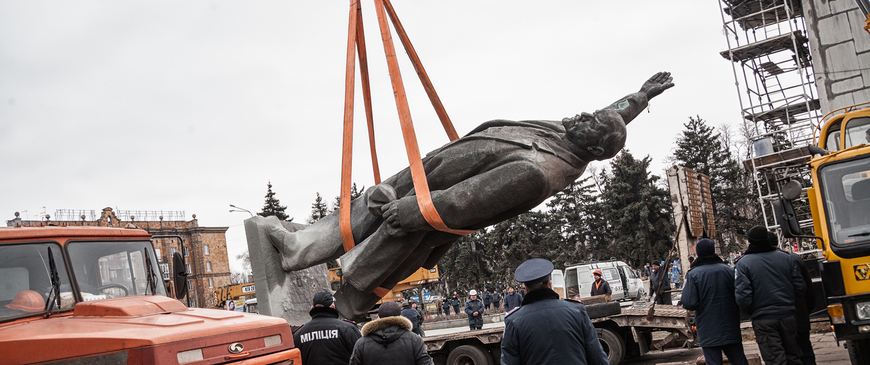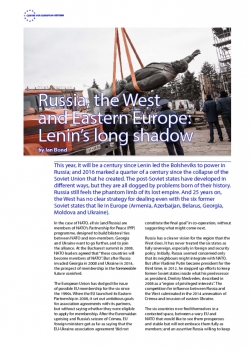
Russia, the West and Eastern Europe: Lenin's long shadow
Russia's neighbours in Eastern Europe are dogged by their Soviet legacy. Both Russia and the West need better strategies to deal with Europe's contested spaces.
This year, it will be a century since Lenin led the Bolsheviks to power in Russia; and 2016 marked a quarter of a century since the collapse of the Soviet Union that he created. The post-Soviet states have developed in different ways, but they are all dogged by problems born of their history. Russia still feels the phantom limb of its lost empire. And 25 years on, the West has no clear strategy for dealing even with the six former Soviet states that lie in Europe (Armenia, Azerbaijan, Belarus, Georgia, Moldova and Ukraine).
In the case of NATO, all six (and Russia) are members of NATO’s Partnership for Peace (PfP) programme, designed to build bilateral ties between NATO and non-members. Georgia and Ukraine want to go further, and to join the alliance. At the Bucharest summit in 2008, NATO leaders agreed that "these countries will become members of NATO". But after Russia invaded Georgia in 2008 and Ukraine in 2014, the prospect of membership in the foreseeable future vanished.
The European Union has dodged the issue of possible EU membership for the six since the 1990s. When the EU launched its Eastern Partnership in 2008, it set out ambitious goals for association agreements with its partners, but without saying whether they were eligible to apply for membership. After the Euromaidan uprising and Russia’s seizure of Crimea, EU foreign ministers got as far as saying that the EU-Ukraine association agreement "did not constitute the final goal" in co-operation, without suggesting what might come next.
Russia has a clearer vision for the region than the West does. It has never treated the six states as fully sovereign, especially in foreign and security policy. Initially, Russia seemed concerned only that its neighbours might integrate with NATO. But after Vladimir Putin became president for the third time, in 2012, he stepped up efforts to keep former Soviet states inside what his predecessor as president, Dmitriy Medvedev, described in 2008 as a "region of privileged interests". The competition for influence between Russia and the West culminated in the 2014 annexation of Crimea and invasion of eastern Ukraine.
The six countries now find themselves in a contested space, between a wary EU and NATO that would like to see them prosperous and stable but will not embrace them fully as members; and an assertive Russia willing to keep them in its orbit by force if necessary, but unable or unwilling to support them economically. This is a bad result for all parties.
Russia is by far the largest economic power in the region, and it has the benefit of the region’s lingua franca, and political and economic networks inherited from the Soviet Union. Yet World Bank statistics show that in 2015 the EU was a more important trading partner than Russia for five of the six (Belarus was the exception). Georgia, which has a common border with Russia, did two and a half times more trade with the EU, having re-oriented its trade away from Russia even before their 2008 war. Russia’s willingness to use economic and military coercion in its neighbourhood has often alienated those who might otherwise align themselves with Russia culturally or economically.
For the EU and NATO, Russia’s use of every tool of soft and hard power to prevent the countries of Eastern Europe joining Western organisations presents dilemmas. Few Western leaders want to admit that Russia has a veto on its neighbours’ foreign policies; but even fewer want to risk confrontation with Russia. The result is that the EU has to deal with weak, unstable and needy partners, and with a Russia which seeks to frustrate co-operation between the EU and its eastern neighbours.
#EU & #NATO have no clear strategy for dealing with the six former Soviet states lying in Europe
For the six countries themselves, Russia’s determination to keep them out of Western clutches has forced them to choose, unnecessarily, between two economic partners. Some, like Belarus, have gravitated more or less willingly to Russia. In others, including Moldova, a combination of Russian pressure, powerful local business interests and Western apathy has hindered political and economic reform. Publics that wanted their countries to meet European standards of governance have become disillusioned
The election of Donald Trump as American president and the EU’s internal problems make it even less likely that NATO and the EU will take in new members. So, what can Eastern European countries do if they are unwilling to join Russian-led organisations but are unlikely to join Western institutions for the foreseeable future?
The top priority, for both the countries concerned and their Western supporters, should be establishing the rule of law. Countries where courts work and laws are stable will be more attractive to foreign investors and less vulnerable to economic pressure. So far, the West has focused on helping civil society organisations and on institution-building in the countries concerned. But it can also help by making it harder for local elites to launder the profits from corruption and acquire assets in the EU or US.
Ensuring that minority ethnic groups are fairly treated is also vital. Disaffected minorities have been fertile soil for Russia to promote separatist conflicts; resolving or preventing tensions will be easier if all communities have a stake in society.
China has been active in recruiting some of the Eastern Partnership states to its One Belt, One Road (OBOR) initiative, designed to upgrade infrastructure and increase trade between China and Europe; without becoming client-states of Beijing, these states should give China a stake in their success as a way of counter-balancing Russian influence.
Geography and economics mean that the Eastern Partnership countries would benefit from good political and trade relations with Russia. They should not shy away from this, as long as relations are on the basis of sovereign equality and mutual benefit. Co-operating together economically with each other and with the EU could help them to achieve a more balanced relationship with Moscow.
Eastern Europe is in a contested space between a wary #EU & #NATO and an assertive #Russia
For the West, the challenge is to balance the theoretical right of the Eastern Partnership countries to aspire to join the EU and NATO with the political reality that the West has no desire to confront Russia over them, especially when they are currently far from meeting the conditions for membership. The West should use the coming years to persuade Moscow that, whether or not these countries join Western institutions (and most probably will not), it is in everyone’s interests that they should be prosperous, stable and well-governed.
Most of these states enjoyed a brief period of independence after the Bolshevik revolution, before Lenin violently re-asserted Russian control. Putin’s Russia continues to behave as though Russia’s fate depends on controlling its neighbours. Europe’s other imperial powers have realised that it is better to have friendly relations with former possessions, and to create shared economic and other interests, than to rely on coercion. It is time for Russia and its neighbours to escape from Lenin’s shadow.
This article is part of a project generously funded by the Open Society Foundations.
Ian Bond is director of foreign policy at the Centre for European Reform.

